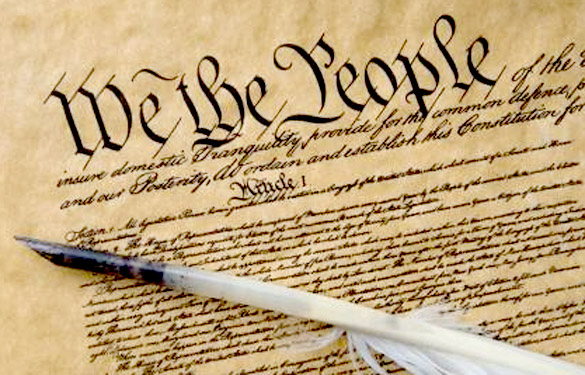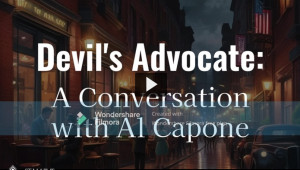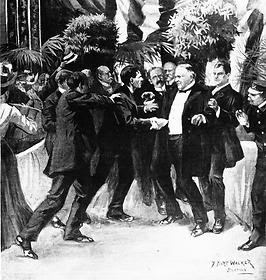Every year there are dozens of scholarly books and articles that are published describing the founding period of the United States. The debate between Federalists and Anti-Federalists over the ratification of the Constitution is one of the topics often discussed. Both the Federalists and the Anti-Federalists presented arguments that have had profound effects on subsequent American history. It is important for us to learn the full nature of their debate and how it has influenced our views on American government.

“Nothing is more certain than the indispensable necessity of government, and it is equally undeniable, that whenever and however it is instituted, the people must cede to it some of their natural rights in order to vest it with requisite powers.”1 Federalists, the supporters of the Constitution, had the support of some of the most prominent men in America, including Benjamin Franklin and George Washington. Moreover, prominent political philosophers of their time, such as Alexander Hamilton, James Madison, and John Jay, published a series of essays under a pseudonym “Publius.” These essays were widely published in newspapers throughout the nation. They explained the meaning and the virtues of the Constitution and countered the powerful arguments of the opposing side. Today, they are known as The Federalist Papers. These documents are important American contributions to modern political theory.2

Patrick Henry, a famous Anti-Federalist, was well known for his quote, “I know not what others may choose but, as for me, give me liberty or give me death!” In order to combat the attention given to those who had different opinions, the Federalists deemed their opponents as “Anti-federalists,” giving the message that individuals that were not associated with the Federalists had nothing to offer besides negative opposition and chaos. However, Anti-Federalists did have serious and intelligent arguments of their own. They presented themselves as the loyal defenders of the principles of the Revolution. Moreover, they believed that the Constitution would betray the principles of freedom by establishing a tyrannical central power in the new government.
The main claims of Anti-Federalists were that a federal government would make unfair distinction among the citizens, raise taxes, abolish the states, and end individual liberties.3 According to them “the constitution was the basic mistrust of human nature and the capacity of human beings to wield power.”4. They believed the Constitution lacked a much needed Bill of Rights, a concern that became one of the most important sources of their opposition, with at least nine out of ten Anti-Federalists wanting a written Bill of Rights.5

At the heart of the debate between Federalists and Anti-Federalists was a battle between two fears. The Federalists were afraid of disorder, anarchy, and chaos; they believed that a constitution would prevent these catastrophic events. The Anti-Federalists were not anarchists and they too recognized the need for an effective government; they believed that the greatest threat to the future of the United States was the government’s potential to become corrupt and seize more power until its tyrannical hand stretched across the country and completely dominated the citizens.6
Despite the Anti-Federalist efforts, the Constitution was ratified in 1790, but during the ratification debate, Madison conceded that a bill of rights was needed. Federalists assured that the first step of the new government would be adopting a bill of rights.
- John Jay, Federalist Papers no 2, (1787), 1. ↵
- Alan Brinkley, American History: Connecting with the Past Volume 2, 15 edition (New York: McGraw-Hill Education, 2014), 145. ↵
- Alan Brinkley, American History: Connecting with the Past Volume 2, 15 edition (New York: McGraw-Hill Education, 2014), 146. ↵
- Alan Brinkley, American History: Connecting with the Past Volume 2, 15 edition (New York: McGraw-Hill Education, 2014), 146 ↵
- Main T. Jackson, The Antifederalists: Critics of the Constitution, 1781-1788 (New York: W.W. Norton, 1974), 159. ↵
- John H. Aldric and Ruth W. Grant, “The Antifederalists, the First Congress, and the First Parties,” The Journal of Politics, vol 55 no. 2 (1993): 295. ↵



71 comments
Victoria Cantu
I enjoyed this article! Seeing both views of the Federalists and Anti-Federalists helped me better understand the chaotic division between these two groups in early history. This article’s information is descriptive and shows that the federalists were scared of change and feared anarchy. It is understandable since the formation of the government was barely beginning. The article also included critical information on the Anti-Federalists’ ideas on the federalist papers. The documents were seen as sketchy. Overall, beneficial article when trying to learn about both groups.
Gabriella Parra
I previously knew of the Federalist Papers, but I didn’t know what the debate between the Federalists and the Anti-Federalists involved. Both sides made good points and had good reasons for their beliefs. In the end, the compromise the Federalists made by adding the Bill of Rights has had a huge, beneficial impact on the US. Your explanation of this debacle was very clear. Great article!
Angelo Oliva-Noeggerath
The pictures used in the article help visualize the situation at hand, and even though it is informative, the pictures add to the information as it supplies information about the persons involved and it also adds well with the picture of the Federalist Papers but also the portrait depicting the signing of our constitution. Shows us that despite being divided they were still civil to meet and respect each other’s ideas. Overall the use of sources and citing helped me follow along and understand where the information was from.
Marycarmen Sanchez
This article was a nice and short summary of what the two sides believed in. But it is completely wild that one side didn’t believe in a Bill of Rights, which would have led to something more tyrannical. This article included all of the right information and kept everything brief and straight to the point. It really helped me putting a definition to the Federalists and Anti-Federalists.
Aaron Onofre
This article was well written and straight to the point. When I look at the Anti-Federalist, I tend to vilify them and question why would they not want to pass the Constitution that has served us so well? This article put a different light on the Anti-Federalist, it shows they were afraid of the government they were creating to become they had just left. They simply wanted to protect individual liberties and sovereignty of the states.
Claudia Sanchez
This article is a great and short summary of the two sides that predominantly plagued the early ratification of the constitution. You did a great job at portraying why each side felt the way they did and what they tried to do to change the minds of others. Still, this article is a great example of how some of the best parts of the founding of this country were based on compromise.
Seth Roen
It is incredible how heated the debates between the parties on what the new country will be in its first few years. So much so that anti-federalists wished for a Bill of Rights to prevent the government from becoming the very tyrannical institution that the new country fought to separate. I thought it was a great article on the two dominating parties in Early American History.
Jaedean Leija
Mehmet Samuk helped understand a bit more and was more specific in telling us the difference between the two groups. I really like how he gave examples as a part of giving a definition but in a more understanding way for people like me who find it hard to know based off of just a definition. I think Samuk wrote a very well article that was not to much or to little but just right for us to learn and classify the difference.
Santiago Sabogal
Personally, I found this article very structured and well developed. It puts the reader in context and explains in a great way the situation between federalists and anti-federalists. I find the sources that the author employed very valid and pertinent, it’s clear that Mehmet did a good resource job. To conclude, Ill like to say that if I found myself located in the 18th I would have been federalist, since I would fear the anarchy and lag of rules or authority. I think that a central power is necessary.
Matthew Gallardo
This article jumped out at me immediately for its great style of writing It gave good information on what the federalists feared (a corrupt government with too much power), and what the federalists feared (too little order and chaos). it also gave the story of the anti-feds against the federalists, with the anti-federalists calling the federalists power hungry people only there for opposition and chaos. Both could easily be followed throughout the article and I appreciate that.